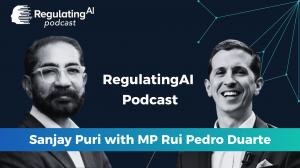Former Portuguese Member of Parliament Rui Pedro Duarte Calls for 'Quantum Diplomacy' to Match AI's Breakneck Speed
Former Member of Portuguese Parliament states traditional governance is too slow for AI era, proposes UN-Like network for real-time global coordination.
"Traditional diplomacy was built for slowness," Duarte explained. "Think about the Peace of Westphalia or Cold War treaties—they took years, sometimes decades to negotiate. But AI breaks that rhythm. By the time diplomats debate lethal autonomous weapons, drones like Kargu-2 are already deployed in Libya, operating on their own judgment. This is the mismatch between political tempo and technological tempo."
Drawing on his unique background spanning 16 years across politics and the private sector—including work with one of the world's largest open-access science publishers—Duarte introduces the concept of "quantum diplomacy" in his recent book. This framework envisions governance that operates at machine speed while remaining grounded in human values, with treaties that "behave more like software, self-updating as risks change."
The implications are radical. Duarte proposes establishing an AI Diplomacy Network—a permanent multilateral hub like Geneva's role in traditional diplomacy—where states, corporations, civil society, and even coders can coordinate in real time. "Coders are the new diplomats," he argues. "They'll code new legislation faster than diplomats can negotiate it. Diplomats have never thought about bringing them to the table, but they're essential partners now."
His vision addresses a critical fragmentation problem: Brussels has its AI Act, Washington has executive orders and state-level protocols, Beijing has five-year plans, while companies like OpenAI and Anthropic set their own constitutional frameworks. "None of these frameworks speak to each other yet," Duarte warns. "It's like having multiple traffic systems with different rules all on the same road. Collisions become inevitable."
When asked about democratic nations competing with authoritarian regimes that can move faster without accountability constraints, Duarte offered a nuanced perspective: "Speed without legitimacy is brittle. Authoritarian speed cracks under pressure. If democracies coordinate—pooling resources for AI safety, aligning on shared standards—they can be stronger. The ability to carry citizens along is the real competitive advantage in the AI age."
Duarte draws inspiration from an unexpected source: the COVID-19 pandemic response. "We saw amazing collaborative velocity during COVID," he notes. "Scientists, pharmaceutical companies, and governments collaborated at unprecedented speed because all science was published in open access. Everyone had access to the same research. Why don't we do the same thing for climate? Almost 50% of climate science is still behind paywalls today."
His message to world leaders is direct: treat AI as critical public infrastructure, not private projects. "AI isn't a sector, it's a systemic force—like electricity. You don't regulate electricity differently for hospitals, schools, or banks. You create a universal framework. With AI, integrated governance is the only way forward."
"The world is transitioning already," Duarte concludes. "The question for those in power right now is: are policymakers ready to transition? Because AI will reshape our social contract whether we're prepared or not. We better get everyone on board as soon as possible."
The key takeaways that need to be considered:
1. Speed is existential: Traditional diplomatic timelines (years or decades) are fundamentally incompatible with AI's exponential development cycle
2. Infrastructure, not product: AI must be treated as critical public infrastructure requiring shared governance, not left to corporate goodwill alone
3. Collaborative velocity over competition: Coordinated democratic responses can outperform authoritarian speed when legitimacy and citizen trust are factored in
4. End silonomics: Fragmented, ministry-by-ministry approaches to AI regulation will always lag; integrated governance across sectors is essential
5. Expand the negotiating table: Effective AI governance requires including coders, civil society, Global South voices, and open-source communities—not just traditional diplomatic actors
6. Learn from COVID: The pandemic demonstrated that open access to information and unprecedented international coordination can produce solutions at unprecedented speed
About RegulatingAI
RegulatingAI, an initiative of Knowledge Networks, is a non-profit organization focused on promoting ethical AI governance. We empower regulators, industry leaders, and advocacy groups with the knowledge and tools necessary to shape the future of AI technologies, ensuring they are developed with trust and transparency.
Ananya Dutta
Knowledge Networks
email us here
Visit us on social media:
LinkedIn
Instagram
Facebook
YouTube
X
Other
Rui Duarte on AI Diplomacy, Statecraft, and the Urgency of Global Governance | RegulatingAI Podcast
Legal Disclaimer:
EIN Presswire provides this news content "as is" without warranty of any kind. We do not accept any responsibility or liability for the accuracy, content, images, videos, licenses, completeness, legality, or reliability of the information contained in this article. If you have any complaints or copyright issues related to this article, kindly contact the author above.


